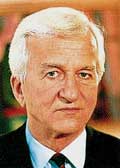 |
Richard Karl Freiherr von Weizsäcker
b. 15 Apr 1920, Stuttgart, German Reich |
| Title: |
Regierender Bürgermeister (Governing Mayor) |
| Term: |
11 Jun 1981 - 9 Feb 1984 |
| Chronology: |
11 Jun 1981,
elected, session of the Abgeordnetenhaus von Berlin (Chamber of Deputies), West Berlin [1] |
| |
11 Jun 1981, took an oath of office as Governing Mayor, session of the Chamber of Deputies, West Berlin [2] |
| |
9 Feb 1984, letter of resignation communicated to the Chamber of Deputies, acknowledged, session of the Chamber of Deputies, West Berlin [3] |
| Other offices: |
Bundespräsident (Federal President) [1 Jul 1984 - 30 Jun 1989] (see details) |
| Biography: |
| Born in the family of diplomat Ernst Freiherr von Weizsäcker; studied philosophy and history in Oxford and Grenoble; joined the army (1938) and participated in World War II fighting in the battles against Poland and Soviet Union; continued his studies in Göttingen (1945-1950) and as lawyer defended his father prosecuted as Nazi state official; made a career in the 1950s mostly connected with the Mannesmann AG mining company; was also an active participant in the Evangelist church affairs serving on many ecclesiastic councils; joined the Christian Democratic Union (CDU) in 1954; remained politically inactive until 1965, when Helmut Kohl proposed his candidacy for the parliamentary elections, but he refused to participate; became a member of the CDU federal board (1966) and was finally elected to the Bundestag in 1969; was considered as a possible candidate to the federal presidency (1968), but the choice fell on Gerhard Schröder, who eventually lost to Gustav Heinemann; while the CDU was in opposition (1969-1982), he actively worked on the party's new program and was a candidate to the post of CDU/CSU leader in the Bundestag, but Karl Carstens assumed the office in May 1973; lost 32 votes to Walter Scheel at the presidential elections (1974); served as Vice President of the Bundestag (21 Jun 1979 - 21 Mar 1981); resigned the office to become the Governing Mayor of West Berlin (11 Jun 1981 - 9 Feb 1984); was elected Federal President (23 May 1984) easily defeating the independent candidate Luise Rinser, supported by the Greens and the Free Democrats; running unopposed for the first time in the history of presidential elections in Germany, he was reelected in 1989; his second term witnessed the process of the unification of Germany; in 1994 the seat of the German presidency was transferred to the Schloß Bellevue in Berlin. |
| Biographical sources: "Die Bundespräsidenten: Biographien eines Amtes", by Günther Scholz (Heidelberg: Decker & Müller, 1990). |
| Elections: |
| Candidate (Richard von Weizsäcker) |
Vote (11 Jun 1981) |
| votes cast |
132 |
| absolute majority |
67 |
| yes |
69 |
| no |
61 |
| abstentions |
2 |
|
| Source of electoral results: Abgeordnetenhaus von Berlin, 9. Wahlperiode, Plenarprotokoll 9/1, 1. Sitzung, Berlin, Donnerstag, 11. Juni 1981, S. 12 (A). |
| |
| [1] |
Abgeordnetenhaus von Berlin, 9. Wahlperiode, Plenarprotokoll 9/1, 1. Sitzung, Berlin, Donnerstag, 11. Juni 1981, S. 10 (A) - 12 (A). |
| [2] |
Abgeordnetenhaus von Berlin, 9. Wahlperiode, Plenarprotokoll 9/1, 1. Sitzung, Berlin, Donnerstag, 11. Juni 1981, S. 12 (B). |
| [3] |
Abgeordnetenhaus von Berlin, 9. Wahlperiode, Plenarprotokoll 9/60, 60. Sitzung, Berlin, Donnerstag, 9. Februar 1984, S. 3621 (B). |

